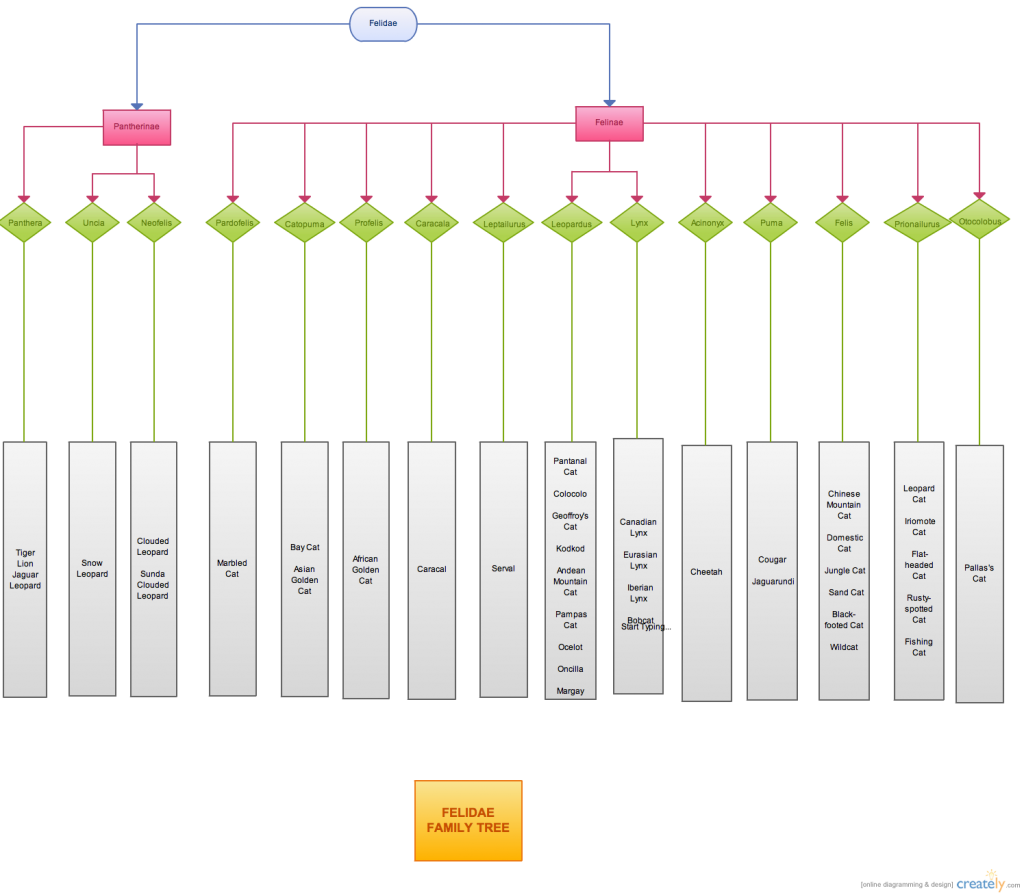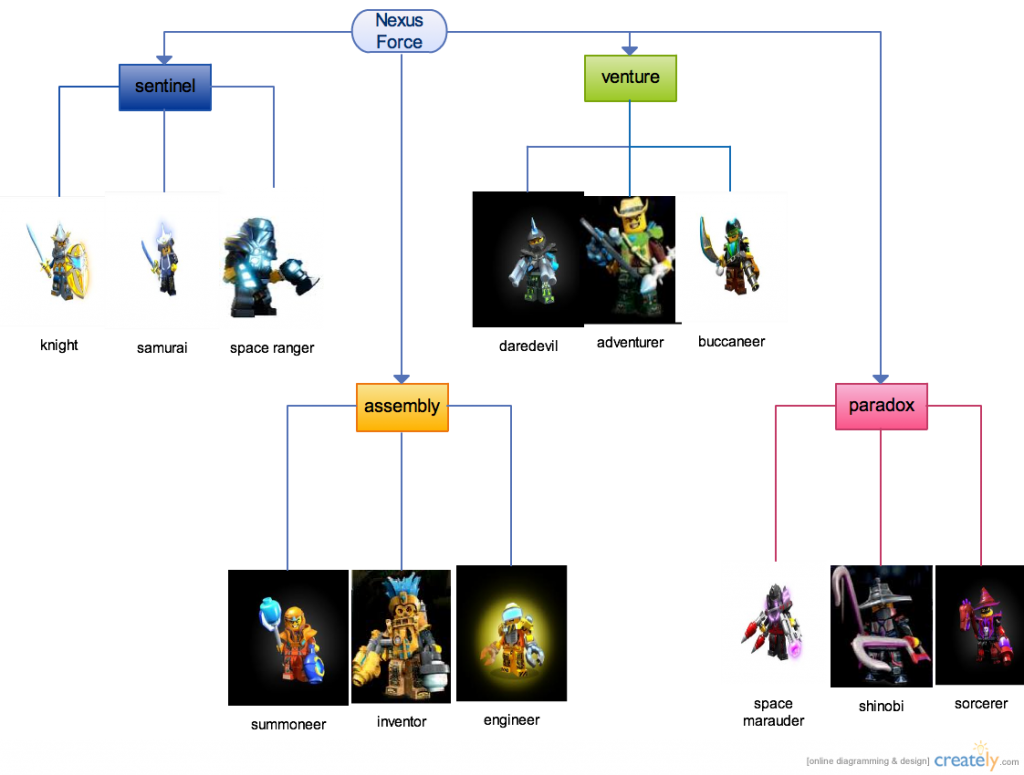What do you do when your kid saves his money to buy a month-long subscription to the Lego Universe online game, and wants to talk of nothing else?
You go with it.
You look through some almanacs together (another recent obsession) and talk about graphs and charts and brainstorm how Lego Universe might lend itself to an intriguing graph.
That’s when he decides that a chart of the universe’s Nexus Force would be a most excellent diversion.
So you set him up with a blank Creately project page and watch him go to town.
Mr. T and I discovered Creately a few weeks back, when he wanted to make a digital tree of the cat family. We searched for a drawing tool for making flowcharts and found some good links on two pages I linked to recently: the infographics post at Langwitches and Troy Hicks’ informational writing wiki.
Mr. T and I sat together, setting up the chart and figuring out how Creately worked. Before long he was working on his own, toggling back and forth between his chart and the felidae family page on Wikipedia, copying, pasting, linking boxes and choosing colors.

Click on the graph to see a larger image which you can zoom in on.
I never have been able to keep all of those leopards, cougars and mountain lions straight. I’ve never seen them all laid out in such a visual way. It’s a useful document, this thing my kid made.
(I wish I’d started T on a tool other than Creately. I had no idea how much he would take to the platform. It’s free for the first five graphs you make, but from then on you need to pay a monthly fee to use it, which doesn’t seem practical, given that we’d likely use it only sporadically.)
Back to that Lego Universe chart. This time T wanted to incorporate images, so I showed him how to do a Google image search, and how to save his finds to our desktop, and then import them into his chart. Do kids pick up on this stuff quickly? Only as quickly as they pick up a bottle of maple syrup when faced with a plate of pancakes.

This chart is also clickable.
Mr. T made another graph recently, this time by hand. This one came about during yet another recent fascination: The Avengers animated series, which he’s worked his way through on Netflix. One day, when he wouldn’t stop talking about Hawkeye, I showed him this page on Figment.com, of wacky charts based on the Harry Potter series.
Go look. The charts and graphs made us giggle. I love the notion that kids can take information from something they’re reading (or watching!) and analyze it with a sense of humor.
I asked T if he’d like to make a similar Avengers-themed chart, and he decided that it would be fun to note how much he liked the various characters throughout the episodes (inspired by Potter chart #3.)

(Click it!)
Once again, I was amazed by his tenacity with this project. He researched the name of every episode and transcribed them on his graph. (His idea, not mine.) I appreciate the home-spun, hand-drawn feel of it. He’s still planning to add more Avengers, and to go over all of the episode titles in pen. The graph has led to conversations about T’s likes and dislikes with the series, and the notion of character development. (What’s up with The Wasp anyway, and why does she get so boring as the season goes on?)
So, what has he learned from these projects?
- How to choose a topic that lends itself to a chart or graph.
- How to share information in a visual format, rather than with pure prose.
- How to research information.
- How to structure that information, in a visual that makes sense to the viewer.
- How to work with new platforms, such as Creately.
- How to import various media to his projects, and to toggle between web sources.
- The role of good design in visual projects. (Check out my thoughts on Daniel Pink’s A Whole New Mind to get a sense of why design is such an important skill for kids to acquire.)
All good stuff. In Mr. T’s mind, though, he was just having fun, exploring some of his current interests in a new way.
Who says you can’t learn from video games and cartoons? Instead of separating popular culture from what kids are learning, I’d argue that we ought to embrace it. I know I’ve said it before, but I’ll keep saying it until I’ve typed off the letters from my keyboard: kids learn best when you start with their interests. Which doesn’t mean that all of their learning has to be based on Thor or Lego space marauders.
But sometimes, it can.

All I can say is, if my kids and I ever make it out your way, I’d love to get our boys together. Their interests have paralleled each other eerily the last few years. Another inspiring post–thank you!
Well then, all you have to do is get out our way! Lots to see out here on the Pacific coast! It would be so fun to meet you one of these days, Carrie.
Agreed!
I agree with this philosophy, but need your advice. My 7 (almost 8) year old is really bright and we follow his interests. He is a bug fanatic, he reads about them, catches things you can not even see, sets up habitats etc. But he has no real interest in writing about them at all. Not a story, or a comic, or a fact based list. I feel like part of it is that he just memorizes everything and talks to me about it all day. Maybe he would need a reason to write… but I can not think of one. His immediate needs are being met – sharing orally and having all the facts in his brain.
Funny–when you wrote “almost 8” in parenthesis, wordpress turned the 8 and the parenthesis into a smiley with sunglasses on!
Amy, when you say, “His immediate needs are being met – sharing orally and having all the facts in his brain”, I can tell that you’ve figured out what’s really important. Sharing orally is such a vital precursor to writing. I sense that you see that he’s on the right track, but that you want to ease him into writing about his passion as well.
One of the best ways to encourage writing, I think, is to help kids find an audience. When my older two were younger, they often liked to set up little museums of what they were collecting. I remember an elaborate rock museum which included many signs labeling rocks–and other ones telling what we could and couldn’t touch! It was set up for my husband and me to visit, and maybe the grandparents too. Maybe your son would like making a bug museum, with signage? It helps if kids know that someone will be coming to visit. He might make tickets, etc.
With something like this, I sometimes find it useful to suggest the activity to a younger sibliing. Maybe you could try “playing museum” with one of your younger kids. If the older one visits, he might be encouraged to try a museum of his own. Or better yet might be a museum made with siblings for parents to visit. Play with the younger sibling might help your son “discover” the fun of museum play, without feeling that it’s being pushed on him. (Because they start to sense when you’re pushing writing, don’t they?)
If you have local homeschooling friends, you might try organizing a science fair, or a math and science fair. Our support group has done this, and it looked very much like the history fair we have each year, which I wrote about here: http://patriciazaballos.com/2011/03/30/host-yourself-a-history-fair/ In this case, the kids could display on science and/or math topics of interest. Being able to share his interest in bugs might be the motivation your son would need. (If you tried this, you might consider taking dictation for parts of his display, since he’s a beginning writer. Maybe he could do some simple labeling himself.) This sort of event can be very motivating for kids because they know people will be looking at their projects.
Then again, maybe it would be easier to encourage writing that isn’t based on his bug passion. Clearly, that’s something that matters a lot to him, and if he senses you trying to turn it into a writing project, he might feel protective, as if you’re trying to manage his very personal interest. How about something totally different, like a secret family journal? Find a notebook, and write an enticing question across the top of a page. Something like, “Where is your favorite hiding place in the house?” Maybe you can write your own answer, and then leave the journal out and see if your son will add to it. Once you get a kid hooked into this, he or she can write questions as well, for you and other family members to answer. It can be a fun thing to do without discussion, maybe even hiding the journal with a new question, for the child to find.
I know it can be hard when you have a kid that’s at an age when you feel that they should be writing. But try not to worry too much, and try not to push it. You can do damage and postpone self-initiated writing even further if you push too much. (Ask me how I know!) Try to work little bits of writing into your kids’ play: playing store, playing restaurant, designing games. Look for small opportunities, don’t push and it will work out. Eventually. Promise.
Oh, and keep him talking to you about his bugs! That discussion and sharing of his passion is golden–and it will help him as a writer in the future.
Thank you so much for the ideas. We have set up museums, but not in a while. Today he caught a big praying mantis, so our menagerie is growing. I think he might be into a bug museum.
He is able to write – there is just not a lot of writing for pleasure. I looked at the links on your side bar and found some great ideas. Like, maybe making a short insect related psa. I know there is a lot of misinformation about bugs and they might just need a 7yo advocate!
Our homeschool group does have a cultural day, I will look into that and see how we can participate. In my smaller co op, we regularly do mini reports on subjects that we are studying. Those have been great for research, graphics, organizing and public speaking. His last one was on the Kraken. He wrote a page of text to read and then just put it down and spoke about the topic off the top of his head. He was thorough and engaged. I guess his writing skills just can not keep up with his mental skills. So, do you think if he just writes small amounts his skills will make a huge leap when he is ready – or should I push more structured practice. In reading (for both my older kids) we worked on mechanics a bit and then at one point, like magic, they just zoomed ahead on their own. Does it work like that in writing too?
I think I will make a huge list of ideas and add a copy of your reply. I appreciate the feedback!
“So, do you think if he just writes small amounts his skills will make a huge leap when he is ready – or should I push more structured practice.”
I absolutely believe that kids who write in small amounts can make huge leaps when they’re ready. Just like they do in reading, as you note, and in learning to talk and to walk, and with everything else that they learn without loads of adult intervention.
They learn these skills because they are internally motivated to learn them.
I’m pretty biased about this, but I think that small amounts of writing which are initiated by the child, or at least related to areas of interest, are far more likely to be beneficial than structured practice-even if it involves greater amounts of writing. The trouble with structured practice is that if children aren’t motivated to do it, the main lesson they may learn is that they dislike writing. They learn that writing is something one does to please an adult–not something one does for personal reasons.
On the other hand, if kids write because the act of writing is meaningful, and helpful to them, and enjoyable, they will continue to do it–because it’s meaningful and helpful and enjoyable!
Seven and almost-eight is a young age to expect writing for pleasure. Sure, there are some kids who really enjoy the written word who may take to writing for fun at young ages. But developing fluency in writing takes years. My guess is three or four years, on average. In the meanwhile, as you know, I’m a big fan of taking dictation (so the writing can keep up with the mental skills!), and of smaller bits of writing here and there.
My nine-year-old writes shorter pieces and lots of lists and such on his own. For longer pieces, he still dictates to me. But he doesn’t think of dictating as a lesser form of writing. It’s all writing to him; it’s all his ideas, and he says that he loves writing. That, to me, is the most important skill I can nurture in him: a love of writing. If he has that, then everything else will fall into place.
Sounds like you’re doing neat things with your son, Amy! I love the idea of a PSA for insects–maybe he will too! Just keep doing what you’re doing, and I’m sure he will “zoom ahead on his own” when he’s ready.
Thought provoking ideas, Patricia – in the post as well as in the comments! You always inspire me 🙂
Thanks so much, Rashmie. The inspiration is mutual!
Great point to keep kids culturally relevant but with your own educational spin! My parents raised me without any television and while it was great for my reading skills, I was always left out of conversations and games b/c I couldn’t even guess what other kids were talking about.
Yep, I try to remember that pop culture doesn’t have to be “bad”. People who think of it that way are missing the opportunities to mine it for all it’s worth! If kids like it, why not let them learn with it?
I thought of you today as my son dictated a chart to me showing the origins and relationships between different Lego Ninjago characters. It’s wonderful to focus on the connecting and learning and relationship-building we’re doing together instead of focusing on trying to force him to write it himself at this point in his development. Thank you!
So happy to hear that, Carrie! I love this:
“It’s wonderful to focus on the connecting and learning and relationship-building we’re doing together instead of focusing on trying to force him to write it himself at this point in his development.”
Yes! He’s had fun exploring something he enjoys with you, and he’s seen the power of transforming his ideas into words. Those are the sort of experiences that will help him understand that writing is worthwhile, and worth pursuing on his own at some point.
Thanks for taking the time to share this with me, Carrie!
I bought A Whole New Mind a while ago, but have only just started it- been nuts around here!
After the nuts die down, give it a skim. I think it would be a great read for a new homeschooler; it gives a sense of the skills our kids will need in the future, which will free you from lots of the school “stuff” that they won’t need.